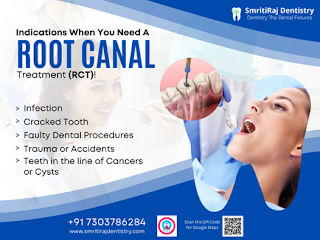Painless Root Canal Treatment in Dwarka, Delhi – Affordable, Trusted Dental Care

When tooth pain disrupts your life, a root canal treatment (RCT) can provide relief and save your smile. At our dental clinic in Dwarka, Delhi, we specialize in painless root canal treatments that are effective, safe, and affordable. If you’re searching for high-quality dental care without the stress, read on to learn why we’re the trusted choice for RCT in Delhi. Why Choose Painless Root Canal Treatment in Dwarka, Delhi? Many people associate root canal treatment with discomfort, but modern dentistry has transformed the experience into a pain-free procedure. Here’s how we ensure your comfort: Advanced Techniques: We use the latest dental technologies to perform root canals with precision and care. Expert Dentists: Our experienced team specializes in painless RCT, ensuring a smooth and stress-free experience. Patient-Focused Care: Your comfort and satisfaction are our top priorities at every step. Convenient Location in Dwarka: Easily accessible for residents of Dwarka and t...



